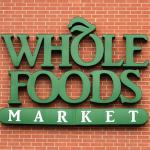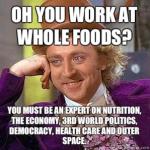The New York Times has some of the worst science coverage in the nation, its Tuesday section notwithstanding.
Organic Food
Living in Seattle, food phobias are everywhere. If you're afraid of conventionally grown fruits and vegetables, GMOs, hormones in meat, pesticides, gluten, or anything that requires a PhD scientist to produce, then Seattle is your organic Mecca.
When it comes to food, biotech, and health reporting, the New York Times is at least consistent: It is guaranteed to be wrong every single time.
One time, Business Insider decided to go grocery shopping.
When a company fires several board members, things are not going well. That's what Whole Foods just did.
Science writers have long suspected that the anti-GMO movement is linked to the anti-vaccine movement. Indeed, both are predicated upon one of the biggest myths in modern society: "Natural is better."1
RT is the Kremlin's propaganda outlet in the United States and around the world. As such, it broadcasts "news" (mostly, the fake variety) that advances the agenda of Russian President Vladimir Putin.
Imagine going to the doctor's office. Noticeably absent are any modern tools -- laptops, DNA tests, X-ray scanners. He likes to do things the old-fashioned way. Medicine was better 100 years ago.
For years now, we've been writing about and assessing the importance to Americans' nutrition from organic foods (not very) and genetically modified (GMO) or genetically engineered foods (potentially highly).












